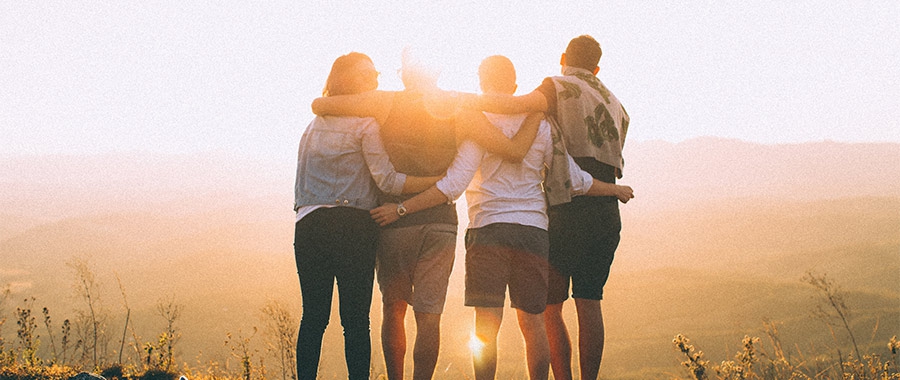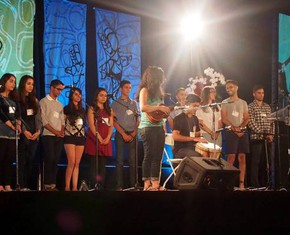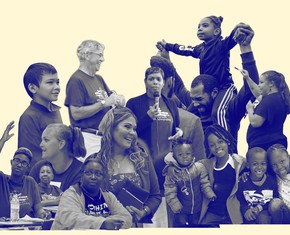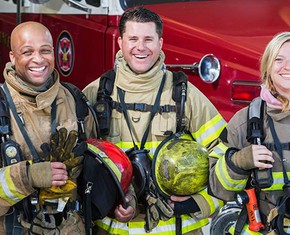The views expressed in our content reflect individual perspectives and do not represent the authoritative views of the Baha'i Faith.
When I was in fifth grade, a family friend invited me to check out this youth group that had formed in a town about forty minutes outside of the city I lived in. Little did I know that this group would change my life.
I remember it clearly: we drove out to Stillwater, Minnesota, the scenery growing more and more rural the further we drove, and my internal discomfort along with it. Unlike how I am today, I was a shy kid, so when we pulled up to a nursing home where the group was performing, I shrunk into myself a little. I wasn’t scared to be friends with people, but the initial steps of breaking into a group of people I did not know well always made me a little quieter than usual.
The group did not always gather at this nursing center, but that day they were singing, reciting poetry, and showing some art pieces about race unity for the residents of the center. Later, I learned that the group was unusually talented in the music and arts. That was one of the ways we all became closer with one another: the arts naturally pulled us together despite our extremely varied circumstances.
When I think back, we were a pretty unique group of kids. We were of different races, ethnicities, classes, faiths, and life circumstances, yet we all became the best of friends. In the Midwest, this was pretty rare. While the Twin Cities have an array of cultural diversity, outside of the cities most people are white, and circumstances tend to be more homogenous.
Most of the people from this youth group are still among my best friends. We’ve spread ourselves out all over the country, and sometimes go long spans of time without catching up—which I am starting to think might just be a part of being an adult trying to maintain a balanced life—but I still love and trust each and every one of them deeply.
You might wonder: what made our friendship survive time and distance, especially when we’re all so different from each other?
The Role of the Arts
Art played a huge role in the way we bonded. We would sing every time we saw each other. We had the violin, clarinet, piano, drums, saxophone, and vocal abilities to bring our souls to life. This brought special power to the prayers we said together at every gathering.
Baha’i writings say:
Although sounds are but vibrations in the air which affect the ear’s auditory nerve, and these vibrations are but chance phenomena carried along through the air, even so, see how they move the heart. A wondrous melody is wings for the spirit, and maketh the soul to tremble for joy. –Abdu’l-Baha, Selections from the Writings of Abdu’l-Baha, p. 147.
I remember feeling the deep effect of our singing. Even when we didn’t have instruments, there was power to bringing music into the mix of our friendship. In a way, it cemented our hearts to one another.
Service—Empowerment to Address Problems
Our friendships were productive, because they focused on the betterment of the world around us. At an age when so many of us were struggling to feel included, we found a place where we were not only a part of a group, but actually saw one another as playing an important role in addressing our world’s issues. Even if we were not always aware of it, I think we learned to see deep value in one another in a way that was rare among my friendships.
Once, we went to a conference about climate change. Even at the young age of twelve or thirteen, I remember being overcome with a deep sense of worry for what would come of our planet. As we collected information from farmers, researchers, and program developers, we learned about the root of the issue in our environment. Though this process alone was enlightening, we didn’t stop at attaining information and building awareness—when we came back from the conference, we procured a small plot of land in a local community garden and grew produce ourselves.
Though this action couldn’t halt climate change altogether, we found a way to contribute to the betterment of our community. Even at an early age, we learned that it was not enough to just learn about the horrors of the world: rather, we could and should do something to address them.
When a friendship grows in this context, you gain so much insight into the spiritual qualities that you each possess. Even though people’s lives change, once you’ve seen the divinity in someone else and watched them develop spiritually, your friendship can persist.
Studying Spiritually Enriching Material and Praying
Around this time, an educational institution called the Ruhi Institute developed a set of materials for young people of all different backgrounds to study. This study was intended to happen in conjunction with what our group had already been doing: art, music, service, and general fellowship.
So, naturally, we jumped into studying the material with the guidance of an older youth who was already familiar with it. The Junior Youth Spiritual Empowerment Program (“junior youth” being the term to describe young adolescents, ages 11 to 14) provided us with even more structured guidance in the deep conversations we had already started to have. We studied quotations that helped us sharpen our understanding of our underlying beliefs. We became better at expressing ourselves and at reading our social reality, and felt galvanized to contribute to change.
This program has developed a lot since the time we were a group. Now, junior youth groups typically happen in communities among neighbors, so that youth can explore their shared social reality together and contribute to more systematic change happening at the grassroots. Being from one consolidated area also allows the group to build unity in a community as they forge bonds of friendship with one another, their families and neighbors may follow. They can become agents of change within a shared space.
Additionally, many other materials have been developed in the past ten years. Junior youth can explore topics as varied as mathematics infused with themes of justice and equality, resilience and empowerment, and how evolution relates to identity. This allows for a more comprehensive educational process that sharpens the moral framework and intellectual capacity of young people.
As someone who has been in such a group, I can only imagine the worldwide effects this program will have as it is applied in more communities. The sense of ownership of society’s well being that it instilled in me makes me imagine that we would all be much better stewards of our communities if we had this kind of support system.
















Comments
Sign in or create an account
Continue with Googleor